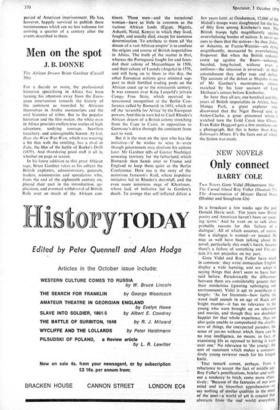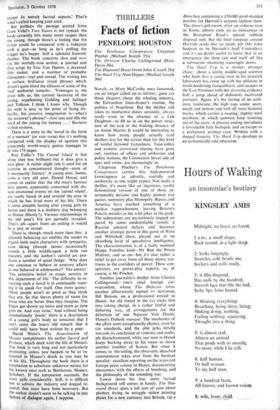NEW NOVELS
Only connect
BARRY COLE
Two Sisters Gore Vidal (Heinemann 30s) The Carnal Island Roy Fuller (Deutsch The Assassination of Mozart David Wens (Hodder and Stoughton 42s) In a broadcast a few weeks ago the poet Donald Davie said: 'For years now British poetry and American haven't been on speak- ing terms.' And he went on to talk about probable reasons for this 'failure of a dialogue'. All of which assumes, of course, that a dialogue is wanted—or needed. He may as well have been talking about the novel, particularly this week's batch, because there's a failure of something and I'm cer- tain it's not prejudice on my part.
Gore Vidal and Roy Fuller have much in common: they write immaculate English. display a wide learning, and are adept at saying things that don't seem to have been said before. Paradoxically the differences
• between them are considerably greater than their similarities (ignoring upbringing and environment). Vidal is apt to pontificate at length: 'As for literature—how feeble the word itself sounds in an age of Rock and bright murder—it has no relevance to the young who were brought up on television and movies, and though they are doubtless happier for that whole experience, they are also quite unable to comprehend the double- ness of things, the unexpected paradox, the sense of yes-no without which there can be no true intelligence, no means, in fact, of examining life as opposed to letting it wash over one.' No relevance to 'the young'; the sort of statement which makes a compara- tively young reviewer reach for his longest knife.
That remark comes, perhaps, from a reluctance to accept the fact of middle age. Roy Fuller's pontifications, briefer and with- out a tendency to bitch, come more objee. tively: 'Because of the fantasies of our own mind and its imperfect apprehension—lo say nothing of similar qualities in the mind of the poet—a world of art is created that abstracts from the real world everything
except its merely factual aspects.' That's what's called keeping your cool.
But perhaps the passage quoted from Gore Vidal's Two Sisters is not typical; the book certainly hits many more targets than the young, though there's a feeling that the writer could be compared with a fedayeen with a gun—as long as he's pulling the trigger he's happy. Still a splendid firework display. The book concerns then and now via the worldly-wise author, a journal and film script by Eric Van Damm, a deceased film maker, and a number of probable characters—real and unreal. The writing has a surface brilliance (tired phrase) which doesn't quite blind the silliness of some of the 'real' authorial remarks: `Vonnegut is, the press tells us, the current favourite of the young, supplanting Golding and Salinger and Tolkien. I think I know why. Though his style is easy to the point of being im- becilic, his creative imagination is—what's the reviewer's phrase?—first rate and fills the need a the young for fantasy . . .' Reviews within reviews.
There is a story to the 'novel in the form of a memoir' (or vice versa) but it's nothing compared with the display of egotism this apparently world-weary genius manages to fit into 174 pages.
Roy Fuller's The Carnal Island is less shiny (not less brilliant) but it does give a nice glow. A rather slight tale is used for an exercise in concentrated thought—most of it necessarily 'literary'. A young poet, James,
visits a very old poet, Daniel House, and comes to realise that the old man's -famous love poems, apparently concerned with dis-
tant emotional events on the 'carnal island', are really based in and around the area in which he has lived most of his life. There is some amiable lusting after young girls by James and there is a doddery dog belonging to House (Hardy?). Various relationships in the old poet's life are partially revealed. That's all—apart from an ending it would be a pity to reveal.
There is, though, much more than this: a splendid balancing act enables the reader to regard both main characters with sympathy, even liking (though James occasionally sounds a little middle-aged, a little too mature), and the author's careful art pro- duces a number of good things: 'Why does one continue to behave in amatory affairs as one behaved in adolescence?' The answer: 'The primitive belief in magic persists in this department of life.' The difficulty in re- viewing such a novel is in continually want- ing it to speak for itself. One more quote:
'Most people aren't as good as they think they are. So that leaves plenty of room for those who are better than they imagine. The bogus get shown up more and more as time goes on. And vice versa.' And without being
ostentatiously 'poetic' there is a description of a young girl's body so sensuous that I can't resist the hoary old remark that it could only have been written by a poet.
David Weiss's The Assassination of Mozart complements his earlier Sacred and Profane, which dealt with the life of Mozart. The book is very long and not particularly interesting unless you happen to be as in- terested in Mozart's death as you may be
in his life. Throughout the book there is a temptation to substitute unknown names for
the known ones such as Beethoven, Mozart, Schubert. If the temptation succeeds, the story palls considerably. Still, it is difficult not to admire the industry and dogged re- search that must have been necessary. But the author doesn't seem to be talking to me; failure of dialogue again, I suppose.







































 Previous page
Previous page